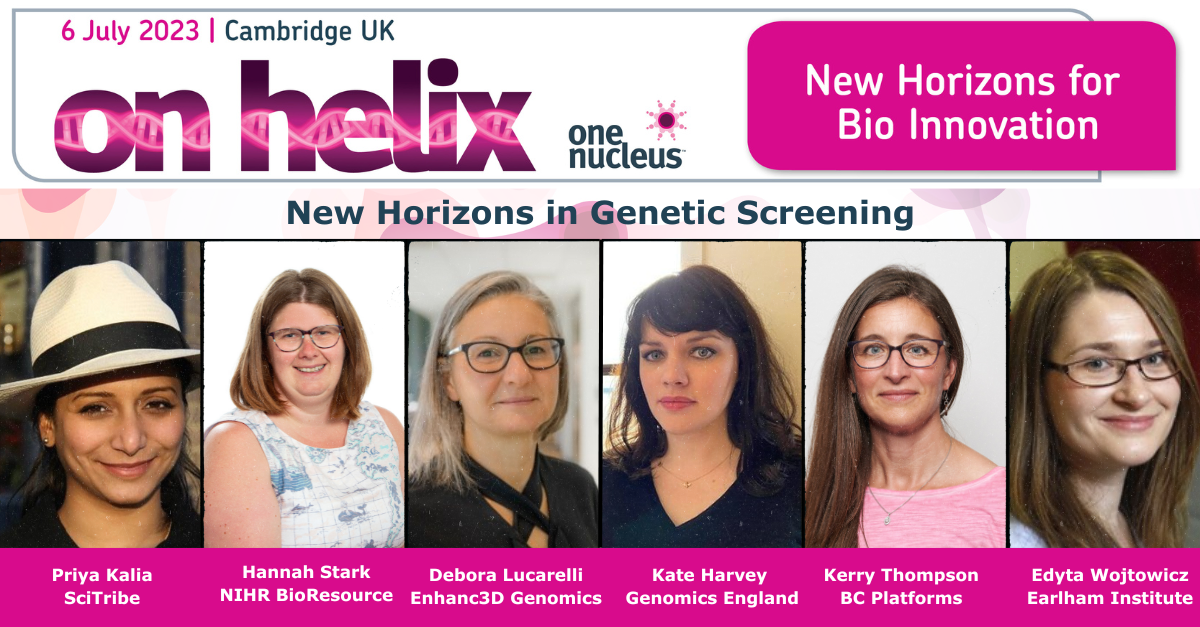Cambridge, UK is home to world-leading genomics research, from the capabilities of the Wellcome Genome Campus championing open access to human genomic data to support research projects; to the likes of Illumina, the global leading provider of sequencing services.
The greatness of the Cambridge ecosystem in genomics continues to accelerate with the emergence of exciting players in this space, such as Biofidelity based on the Cambridge Science Park; a revolutionary company dedicated to unleashing the potential of genomics to transform human health which has recently entered both the Young Company of the Year and Disruptive Technology Business Weekly awards. Other examples include Enhanc3d Genomics, a spinout company from Babraham Institute (Cambridge, UK) and Congenica, a spin-off from the Wellcome Sanger Institute. The former is unlocking the potential of the 3D genome to advance development of therapeutic targets and biomarkers and the latter was announced as Britain’s fastest growing genomics start-up following £39M Series C funding in November 2020. Looking beyond unlocking the human genome, Eagle Genomics, who are based at the Wellcome Genome Campus, are exploring the microbiome including genomics and multi-omics, which represents another promising route to potential therapeutics.
 The scale of investment into this space also sets Cambridge apart with exciting developments announced for the Wellcome Genome Campus expansion which will deliver a near doubling of the built area of the existing campus, including 180,000 square feet of new research space. The recently opened Source BioScience genomics and precision medicine centre in Cambridge is aimed at providing cutting-edge technologies to Life Science and academic partners and further supports the ‘Cambridge Phenomenon’.
The scale of investment into this space also sets Cambridge apart with exciting developments announced for the Wellcome Genome Campus expansion which will deliver a near doubling of the built area of the existing campus, including 180,000 square feet of new research space. The recently opened Source BioScience genomics and precision medicine centre in Cambridge is aimed at providing cutting-edge technologies to Life Science and academic partners and further supports the ‘Cambridge Phenomenon’.
As the cost of genetic screening comes down and is no longer as prohibitive as it was in the past, with a greater array of genomic technologies, there is an exciting opportunity for our industry to incorporate more genetic information into better healthcare outcomes.
Our opening panel at ON Helix 2023 “New Horizons in Genetic Screening” will be moderated by Priya Kalia, Managing Director at sciTribe. Priya has 20+ years in the Life Sciences sector including corporate and scientific communications, a research background in regenerative medicine and BSc (Hons) in Molecular Genetics and Molecular Biology. Our panel will look at the impact of genomic screening across the different stages of life, from newborns through to the elderly, as well as those with rare or chronic conditions. The panel will also discuss the challenges this potentially raises around ethics, diversity and patient engagement. With a range of expertise from those working with different, pivotal technologies and programmes, it promises to be an insightful discussion on the future of genetic screening.


Making up our panel we have stakeholders who can comment on NHS resources and the ability of this system to harness the power of genomic screening including, Hannah Stark, Operations Lead at NIHR BioResource for Translational Research and Kate Harvey, Engagement Manager at Genomics England. NIHR BioResource were integral in supporting the 100,000 Genomes Project and Hannah is responsible for the coordination of volunteer recruitment across all NIHR BioResource programmes, including rare diseases. It will be interesting to hear Hannah’s views on the role of population-based screening for diagnosing and treating disease more efficiently and the challenges this raises for patient engagement.
 Kate’s background in ethics and engagement, including prior involvement in the Genomics England Newborn Screening programme and her previous role at the Nuffield Council on Bioethics, means that she is well-versed in what ethical considerations should be considered when using different genetic screening technologies. Interestingly, there is growing evidence that DNA sequencing of newborns can have a life changing impact on babies with treatable genetic disease following results of a research survey from the Massachusetts General Hospital for Children and Harvard Medical School, published in JAMA.
Kate’s background in ethics and engagement, including prior involvement in the Genomics England Newborn Screening programme and her previous role at the Nuffield Council on Bioethics, means that she is well-versed in what ethical considerations should be considered when using different genetic screening technologies. Interestingly, there is growing evidence that DNA sequencing of newborns can have a life changing impact on babies with treatable genetic disease following results of a research survey from the Massachusetts General Hospital for Children and Harvard Medical School, published in JAMA.
Providing an advocacy perspective on the panel we have Kerry Thompson, Director, Data Partnerships at BC Platforms, a global leader in Life Science and healthcare data management and analysis. Its global data partner network with clinical data from over 55 million patient lives covering Europe, Africa, the Americas and Asia-Pacific region, means Kerry is well positioned to talk about the value of secure data sharing within federated networks, which can support faster translation into actionable insights. The Health for Life in Singapore (HELIOS) study is a recently announced example of how BC Platforms is building presence in Asia to deliver insights into heart disease, diabetes, cancer, and other chronic diseases.
From an industry perspective, Debora Lucarelli, CEO at Enhanc3D Genomics will be participating and can speak to the future technology of genomic research with the potential to play a significant role in the clinic. Functional genomics, which uses molecular biology tools to enhance our understanding of the links between genes and disease and is an up-and-coming area. The Life Sciences Vision set out in 2021 aims to support developments in areas such as this to ensure that the UK remains positioned atthe forefront of the new age of computational biology tools.
Completing the panel we have Edyta Wojtowicz, Group Leader at Earlham Institute, a large, UK-based multi-disciplinary bioinformatics institute. It was recently announced that Earlham Institute have been awarded £31.4m to power data-intensive bioscience; part of a larger amount of funding awarded by the BBSRC to the Earlham Institute, John Innes Centre and Quadram Institute. It will be interesting to hear Edyta’s insights into how this will create more opportunities for clinical intervention. This is especially important in clinical areas where there is still a high unmet need, such as neonatal medicines, cancers and rare diseases.
In conclusion, our panel will identify opportunities and challenges where we can better support health and identify diseases throughout the life course to change disease management, whilst also moving towards a roadmap to use genetic data in a more diverse, sustainable, and ethical manner.
ON Helix offers much more, check out the full keynote programme.
